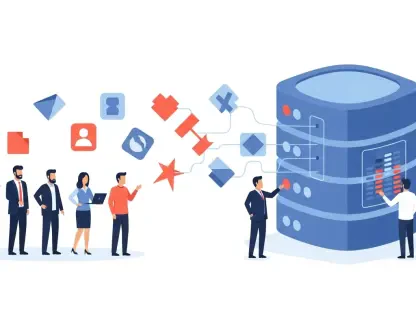Listen to the Article
There is no doubt that data is the blood of your organization—even more so than ever before, due to the fast-paced digitalization pressuring enterprises to become increasingly virtual. Corporate leaders have known for years that a data-driven enterprise is the key to remaining competitive long-term.
But the shocking emergence and advancements of artificial intelligence (AI) have not only revamped the importance of data. They’ve also increased it, to a point where today, many departments of your enterprise must know its value and be familiar with it to expertly introduce it into their operations.
If you’ve worked with data-powered processes before, you know there’s a pain point in doing this: the fact that, quite frequently, insights taken from vast quantities of data can’t reach everyone who needs them; especially non-technical teams.
That’s where democratization comes into play. While traditionally, Business Intelligence (BI) tools were reserved for experts such as analysts and IT specialists, new technologies are changing the game. More intuitive solutions are opening up access to a broader range of employees, offering them the power and potential to make the best decisions—without relying on the deep expertise of data scientists.
This article will walk you through the new era of Business Intelligence, the benefits of data democratization, and how you can use these advancements to bring the best performance out of your workers.
What Is Data Democratization?
When it comes to data democratization, you can’t jump directly into its benefits and potential use cases. First, you must fully understand its concept, importance, and evolution.
The past was vastly different from the present. Data was, more often than not, locked away in complex databases and reporting systems that were almost impossible to decipher by those lacking the expertise to do so. Only specialized roles, trained with the knowledge for handling this part of a business (such as data scientists and business analysts), could navigate them and extract the required insights.
Thankfully, that’s no longer the case for most organizations. Data democratization, defined ass the process of making data accessible to all employees within an organization (regardless of whether they have technical proficiencies or not), has one key goal: that of breaking down data silos—and letting everyone analyze insights to make empowered decisions regarding your operations.
Naturally, this means that all of your teams, whether they are marketing, sales, HR, or customer support, can use data-informed processes to improve strategies, bring the best outcomes, and find hidden opportunities for success.
The Evolution of Business Intelligence Technology: From Complex to Intuitive
The early days of BI were challenging to navigate. Tools were clunky and required users to be agile and technical know-hows. In fact, many professionals were using them to write complex SQL queries and design elaborate dashboards that, while efficient, were lacking in the speed and ease that can be found in today’s data ecosystem.
Soon, businesses began to put more emphasis on the importance of data-driven processes and how they impact overall decision-making across the board. BI companies understood the shifting trend and the shortcomings of traditional technologies, focusing on a more reliable approach: the development of user-friendly, intuitive and easily accessible solutions, accessible to a much broader audience.
The innovation didn’t stop there. After the initial changes, the corporate landscape was introduced to no-code and low-code platforms. These tools are allowing users to build dashboards, reports, and data visualizations without writing a single line of lone. Additionally, many BI platforms now come with pre-built templates that make the work of your specialists faster, easier, and more productive. They fit a large variety of common business cases, such as: sales performance, customer engagement, and financial analytics—reducing the learning curve and speeding up time to value.
The Benefits of Using Data Democratization in BI (+ the Best Tooling)
Faster Decision-Making: With data accessible to everyone, decision-making is no longer seen as a complicated and painful process that requires time and continuous effort. Data democratization offers BI operations a newfound agility, allowing all non-technical teams to achieve peak performance, without waiting for reports from your data analysts or IT departments. This ability to act swiftly on emerging trends, disruptions, or market changes can make or break your competitive edge, deliver continuous innovation, and speed up your business.
Both Tableau and Power BI unlock the best functionality for creating dashboards, unifying multiple data sources, and keeping users on track with quick decisions based on updated insights. They offer real-time access to data on consumer behavior, campaign performance, and KPIs. More importantly, they provide a fast integration and ease of use that won’t hinder your existing processes or slow down operations.
Increased Collaboration: An element that’s overshadowed when it comes to investment decisions regarding data democratization is its potential for boosting collaboration between departments. Equipping all of your teams with the same data allows them to work together to identify shifting market expectations, solve problems, and maintain a continuous and high-level of productivity. By bringing this technology to your enterprise, you break down barriers between employees and create a culture of shared insight that aligns strategies, goals, and your long-term success vision.
If you’re looking to capitalize on this advantage, turn your attention to Google Data Studio and Looker. Through them, you can create a space that empowers employees to share data models and collaborate together on reports, dashboards and analytics. Every team can use the same definitions and calculations to ensure consistency and peak coordination across all sides of your business. These integrations not only make data much more accessible; they make sure that your teams can maintain an always-on connection to reduce the risk of errors that might slow down business or cause profit losses.
Improved Innovation: With data at their fingertips, non-technical teams have expanded freedom to experiment with new ideas, optimize processes, and even identify opportunities that might have been missed in the past. Data democratization gives your departments the power to explore data freely at their own pace and bring their own vision to life—either by testing assumptions, creating solutions based on evidence, or finding insights into testing real-life scenarios.
That’s why implementing platforms such as Qlik Sense or Zoho Analytics takes most of the guesswork out of innovation. They unleash an entirely new level of potential in regard to data exploration and visualization. By offering advanced features created specifically to bring an equal advantage even to your non-technical workers, they foster an environment where ideas, strategies, and solutions can be developed on data-driven insights—and not on gut feeling or intuition.
Conclusion
In 2025, data democratization is no longer a trend. It’s a business necessity, one that will shape the future of BI and foster a more agile, collaborative, and data-driven culture. As BI tools continue to evolve and become increasingly more intuitive, the potential of data will become accessible to everyone. As an innovation leader, this will allow you to power up all of your departments, drive smarter decisions, and encourage growth across the organization.
It’s a future where data can truly be in the hands of all employees.









